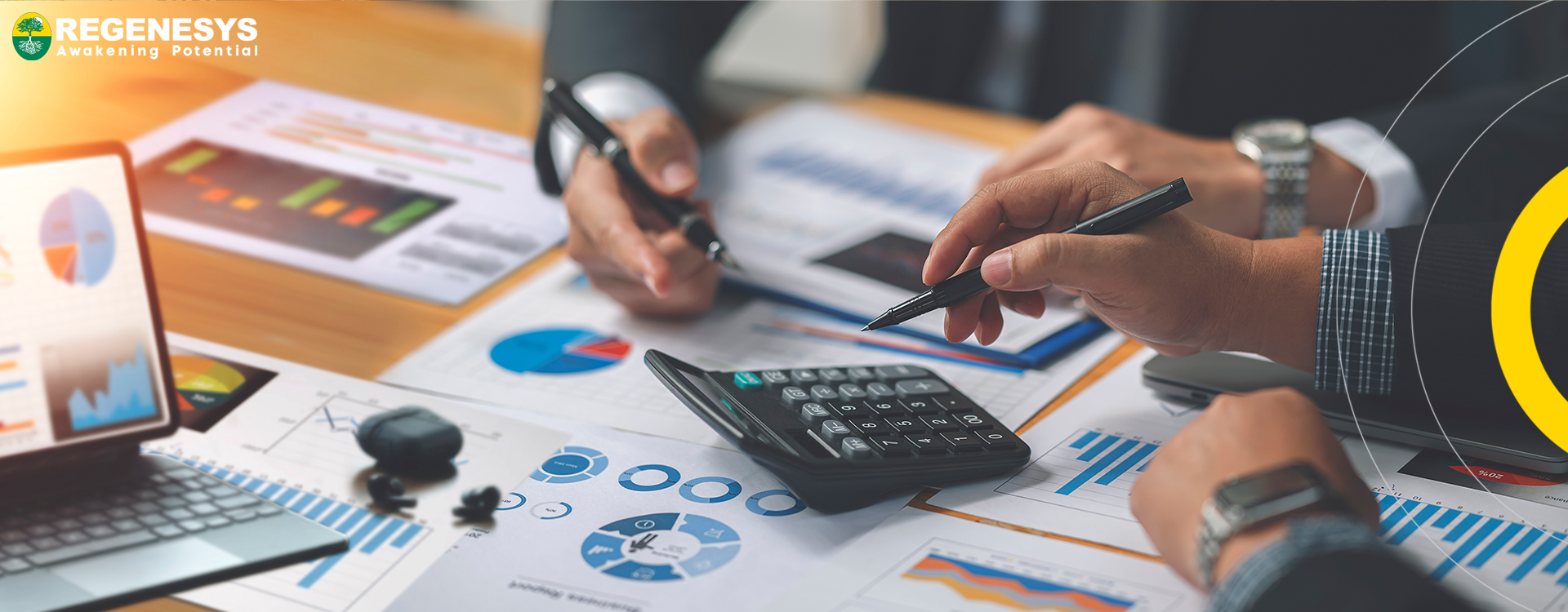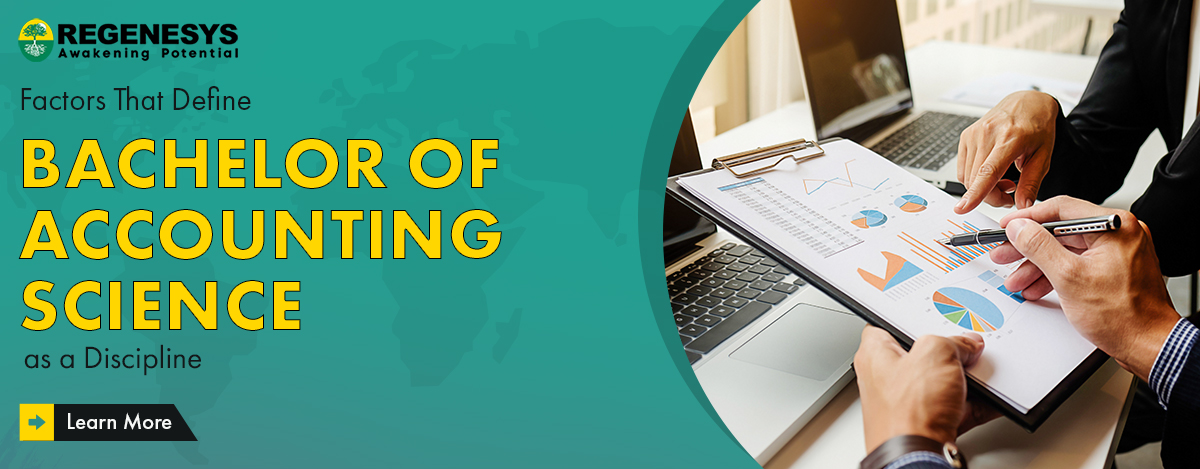In today’s business and financial world, accounting is essential. It helps businesses stay stable and grow. Accounting, often seen as business language, is essential for keeping track of money movements and helping with decision-making.But is accounting truly a science? Let’s explore Accounting Science and its significance to solve this intriguing question, especially the Bachelor of Accounting Science(BCOMPT) Programme at Regenesys.
Table of Contents:
- Understanding Accounting Science
- The Bachelor of Accounting Science Programme
- Scientific Methodology in Accounting
- Regenesys’ Approach to Accounting Science
- The Evolution of Accounting
- Conclusion
- Frequently Asked Questions (FAQs)
Understanding Accounting Science
Accounting Science is a structured way of recognising, measuring, recording, and sharing financial details about a company’s money-related actions. Its primary purpose is to provide stakeholders with a clear understanding of the entity’s financial health and performance. Some say accounting is like art because it involves interpreting certain principles. But fundamentally, it relies on scientific methods.
The Bachelor of Accounting Science Programme
Regenesys is a renowned educational institution known for its commitment to quality education and holistic development. Introducing an all-encompassing Bachelor of Accounting Science(BCOMPT) Program. This program equips students with a strong academic foundation and practical skills to thrive in the constantly evolving accounting field.
Regenesys focuses on a broad approach by combining theoretical knowledge with hands-on experience. This ensures graduates are well-prepared to navigate the complexities of financial accounting. The Programme encompasses various subjects, including financial reporting, taxation, auditing, economics, and business law, creating a holistic learning experience.
Scientific Methodology in Accounting
At its core, accounting follows a scientific methodology that involves systematic steps to ensure accuracy, reliability, and fairness in financial reporting. Let’s break down how accounting aligns with the principles of science:
- Observation and Measurement: Just as scientists observe natural phenomena, accountants observe and measure financial transactions. They collect data about economic events and quantify them in terms of monetary values.
- Data Collection: Similar to scientific experiments, accountants gather data from various sources, including invoices, receipts, bank statements, and more. This data forms the basis for financial records and reports.
- Grouping: Accountants classify transactions, such as assets, liabilities, revenues, and expenses. This group enables effective organisation and analysis of financial information.
- Hypothesis Testing: Hypotheses are assessed through financial analysis. Ratios, trends, and comparisons assess an organisation’s financial performance and stability.
- Consistency: Just like scientific discoveries must be consistent and reproducible, accounting principles ensure that financial information maintains consistency over time and can be duplicated for accurate decision-making.
- Communication: Accountants communicate financial information through reports like balance sheets, income statements, and cash flow statements. These reports are akin to scientific papers, merely conveying complex findings.
- Ethical Considerations: Similar to the ethical guidelines followed in scientific research, accountants adhere to ethical standards to ensure the accuracy and integrity of financial information.
Regenesys’ Approach to Accounting Science
Regenesys, with its commitment to excellence in education, provides students with a unique blend of theoretical knowledge and practical exposure. The Bachelor of Accounting Science(BCOMPT) Programme imparts technical skills and nurtures critical thinking, problem-solving, and communication abilities.
Through case studies, real-world simulations, and industry interactions, students gain insights into applying accounting principles in diverse business scenarios. This approach enhances their analytical skills and prepares them to adapt to the ever-evolving landscape of financial regulations and technology.
The Evolution of Accounting
Accounting has evolved significantly over the centuries, mirroring the progression of science itself. From single-entry bookkeeping to modern double-entry accounting, the field has embraced advancements in technology and methodology. The Bachelor of Accounting Science(BCOMPT) Program at Regenesys stays current with the latest industry trends, ensuring graduates have modern skills.
Conclusion
In conclusion, accounting possesses the characteristics of science due to its systematic methodology, empirical observations, data analysis, and adherence to ethical standards. The Bachelor of Accounting Science(BCOMPT) Programme offered by Regenesys exemplifies this scientific essence by providing students with a comprehensive education that merges theoretical knowledge with practical application.
As we journey through the dynamic world of finance and business, it becomes evident that accounting science is essential and integral to sustaining economic growth and organisational success. Regenesys’ commitment to nurturing skilled accounting professionals underscores the importance of a rigorous academic foundation in this field, making it an ideal choice for aspiring accountants seeking a Bachelor of Accounting Science degree.
FAQs:
-
Is accounting really a science?
The blog explains how accounting follows a scientific methodology, including observation, data collection, categorisation, hypothesis testing, and ethical considerations. This scientific approach ensures accuracy, reliability, and objectivity in financial reporting.
-
What is the Bachelor of Accounting Science Programme at Regenesys?
The blog highlights Regenesys’ Bachelor of Accounting Science(BCOMPT) Programme, which provides a comprehensive education in accounting. It combines theoretical knowledge with practical experience, preparing students to excel in various aspects of financial accounting.
-
How does Regenesys’ approach differ from traditional accounting education?
The blog outlines Regenesys’s broad approach, incorporating case studies, simulations, and industry interactions. This approach goes beyond theoretical learning, fostering critical thinking, problem-solving, and adaptability in students.
-
How does accounting evolve alongside advancements in technology?
The blog mentions how accounting has evolved over time, embracing technological advancements just like the scientific field. It also highlights how Regenesys’ Programme keeps up with industry trends to equip graduates with modern skills.
-
Can you elaborate on the ethical considerations in accounting?
The blog draws a parallel between ethical guidelines in scientific research and ethical standards in accounting. It explains how adhering to these standards ensures the accuracy and integrity of financial information.
-
How does the Bachelor of Accounting Science Programme prepare graduates for the real world?
The blog details how the Programme at Regenesys incorporates real-world simulations, case studies, and interactions with industry professionals. This approach not only enhances analytical skills but also prepares students to navigate the ever-changing financial landscape.







